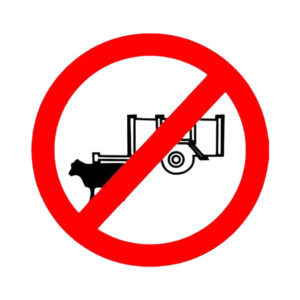₹1,999.00 Original price was: ₹1,999.00.₹1,399.00Current price is: ₹1,399.00.
In stock





The LADWA Horn Prohibited Mandatory Retro Reflective Road Signage is a highly visible traffic sign designed to convey the mandatory prohibition of horn usage on a specific road or in designated areas. This circular road sign has a diameter of 600 mm and is constructed with retro-reflective materials, ensuring excellent visibility during both daytime and nighttime, making it highly effective in all lighting conditions.
The LADWA Horn Prohibited Mandatory Retro Reflective Road Signage is a crucial tool for traffic management, providing essential instructions to road users regarding the prohibition of horn usage in specific areas. As a mandatory sign, it carries legal significance, and adherence to this restriction is obligatory for all road users.
Constructed with retro-reflective materials, the sign ensures optimal visibility even during adverse weather conditions or low-light situations, making it highly effective in conveying the no-horn message to drivers and other road users. The standard design of the sign includes a white circular symbol with a red border, making it easily recognizable and distinguishable from other road signs.
The LADWA Horn Prohibited Mandatory Retro Reflective Road Signage plays a significant role in promoting a quieter and more respectful road environment, as it enforces the restriction on horn usage in specific areas. Whether it’s near hospitals, educational institutions, residential zones, or any other noise-sensitive areas, this mandatory sign contributes to a safer and more peaceful transportation system by guiding road users to refrain from using horns in the designated locations.
| Weight | 50 kg |
|---|---|
| Dimensions | 7.5 × 7.5 × 10.5 cm |




kjZswRrJmSA –
bXznLQlRpkNrW
EDoNaAvtCkKdZMnL –
YejuItSEpATs
Mancubus0zep –
vibrometer
Understanding the Vibrometer: A Key Tool for Vibration Analysis and Balancing
The vibrometer, a crucial instrument in the field of mechanical engineering, plays a significant role in ensuring the optimal performance of various rotating machinery. The Balanset-1A vibrometer, specifically designed for dynamic balancing and vibration analysis, stands out for its dual-channel capabilities, enabling it to address a broad spectrum of industrial applications.
What is the Balanset-1A Vibrometer?
The Balanset-1A is an advanced portable balancer and vibration analyzer that offers powerful features for dynamic balancing in two planes. Its versatility is engineered for a variety of equipment, such as crushers, fans, mulchers, augers, shafts, centrifuges, turbines, and many other rotors. The device is pivotal for industries seeking to minimize downtime and enhance productivity through precise vibration analysis.
Core Features and Functionalities
The Balanset-1A vibrometer boasts an array of features that streamline the balancing process and ensure high precision in vibration analysis. Its core functionalities include:
Vibrometer Mode: It encompasses various parameters essential for effective vibration measurement, including:
Tachometer: This function accurately measures the rotational speed (RPM) of the machinery, providing critical data for further assessments.
Phase Measurement: This feature determines the phase angle of the vibration signal, which is vital for understanding the mechanics of the rotor’s behavior.
Overall Vibration Monitoring: It assesses general vibration levels to ensure the equipment operates within acceptable limits.
FFT Spectrum Analysis: This advanced analysis provides insight into the frequency spectrum of vibration signals, allowing users to diagnose potential issues early.
Measurement Log: With this functionality, the device can save historical measurement data for review and follow-up analyses.
Balancing Mode: The Balanset-1A also focuses on effective balancing, offering:
Single Plane Balancing: This reduces vibration by fine-tuning rotors in a single plane, effectively addressing imbalance issues.
Two Plane Balancing: For a more comprehensive approach, this ensures dynamic balancing by targeting imbalances in two planes.
Visual Features: The device includes charts that allow for detailed graphical representation of vibration characteristics, showcasing overall vibration, frequency components, and harmonic presence.
Additional Capabilities and Specifications
Beyond its primary functions, the Balanset-1A vibrometer offers additional capabilities that enrich its usability:
Archive and Reports: Users can archive past balancing sessions and generate detailed reports on balancing outcomes, which aids in future planning and maintenance.
Re-balancing: This feature allows the user to repeat the balancing process with previously saved data, simplifying the task and enhancing efficiency.
Compatibility: The Balanset-1A supports both Imperial and Metric systems, catering to users worldwide.
With technical specifications that include two vibration sensors (vibro accelerometers), an optical sensor for precise measurement, and software for PC connectivity, the Balanset-1A ensures top-notch performance across the board. Its weight of just 4 kg makes it easily portable, a significant advantage for technicians performing on-site analysis.
The Importance of Vibration Analysis
Executing effective vibration analysis with tools like the Balanset-1A vibrometer is essential for numerous reasons. Here’s why vibration analysis holds a vital place in industrial environments:
Prevention of Equipment Failure: Regular vibration analysis helps detect imbalances and mechanical failures before they escalate into severe issues, reducing unexpected downtime.
Safety Enhancements: Consistent monitoring of vibration conditions promotes workplace safety, preventing accidents caused by failing machinery.
Operational Efficiency: Fine-tuning equipment performance through vibration analysis ensures that machines run at optimal efficiency, saving on energy costs and minimizing wear.
In Conclusion
The Balanset-1A vibrometer is an indispensable tool in the arsenal of modern maintenance and engineering practices. Its sophisticated design, comprehensive functionalities, and commitment to precision make it a favored choice among professionals tasked with the responsibility of ensuring that machinery operates smoothly. By integrating the use of a vibrometer into routine maintenance protocols, industries can achieve greater reliability, improved safety, and increased efficiency in their operations.
For those looking to enhance their maintenance capabilities and achieve precise dynamic balancing, investing in a high-quality vibrometer like the Balanset-1A is a step towards achieving operational excellence.